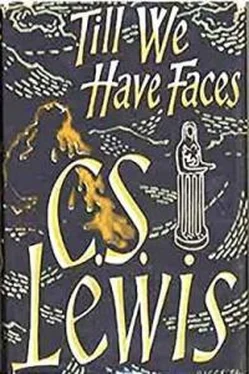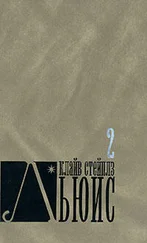One day when this deadness was at its worst I came into the house by the little door that leads into a narrow passage between the guards’ quarters and the dairy. I sat down on the threshold, less weary of body (for the gods, not out of mercy, have made me strong) than unable to find a reason for going a step further in any direction or for doing anything at all. A fat fly was crawling up the doorpost. I remember thinking that its sluggish crawling, seemingly without aim, was like my life, or even the life of the whole world.
“Lady,” said a voice behind me. I looked up; it was Bardia.
“Lady,” he said, “I’ll make free with you. I’ve known sorrow too. I have been as you are now; I have sat and felt the hours drawn out to the length of years. What cured me was the wars. I don’t think there’s any other cure.”
“But I can’t go to the wars, Bardia,” said I.
“You can, almost,” he said. “When you fought me outside the other Princess’s door (peace be on her, the Blessed!) I told you you had a good eye and a good reach. You thought I was saying it to cheer you. Well, so perhaps I was. But it was true too. There’s no one in the quarters, and there are blunt swords. Come in and let me give you a lesson.”
“No,” said I dully. “I don’t want to. What would be the use?”
“Use? Try it and see. No one can be sad while they’re using wrist and hand and eye and every muscle of their body. That’s truth, Lady, whether you believe it or not. As well, it would be a hundred shames not to train anyone who has such a gift for the sport as you look like having.”
“No,” said I. “Leave me alone. Unless we can use sharps and you would kill me.”
“That’s women’s talk, by your favour. You’d never say that again once you’d seen it done. Come. I’ll not leave off till you do.”
A big, kindly man, some years older than herself, can usually persuade even a sad and sullen girl. In the end I rose and went in with him.
“That shield is too heavy,” he said. “Here’s the one for you. Slip it on, thus. And understand from the outset; your shield is a weapon, not a wall. You’re fighting with it every bit as much as your sword. Watch me, now. You see the way I twist my shield—make it flicker like a butterfly. There’d be arrows and spears and sword points flying off it in every direction if we were in a hot engagement. Now: here’s your sword. No, not like that. You want to grip it firm, but light. It’s not a wild animal that’s trying to run away from you. That’s better. Now, your left foot forward. And don’t look at my face, look at my sword. It isn’t my face is going to fight you. And now, I’ll show you a few guards.”
He kept me at it for a full half–hour. It was the hardest work I’d ever done, and, while it lasted, one could think of nothing else. I said not long before that work and weakness are comforters. But sweat is the kindest creature of the three; far better than philosophy, as a cure for ill thoughts.
“That’s enough,” said Bardia. “You shape very well. I’m sure now I can make a swordsman of you. You’ll come again tomorrow? But your dress hampers you. It would be better if you could wear something that came only to your knee.”
I was in such a heat that I went across the passage into the dairy and drank a bowl of milk. It was the first food or drink that I had really relished ever since the bad times began. While I was in there, one of the other soldiers (I suppose he had had a sight of what we were doing) came into the passage and said something to Bardia. Bardia replied, I couldn’t hear what. Then he spoke louder: “Why, yes, it’s a pity about her face. But she’s a brave girl and honest. If a man was blind and she weren’t the King’s daughter, she’d make him a good wife.” And that is the nearest thing to a love–speech that was ever made me.
I had my lesson with Bardia every day after that. And I knew soon that he had been a good doctor to me. My grief remained, but the numbness was gone and time moved at its right pace again.
Soon I told Bardia how I wished to go to the Grey Mountain, and why.
“That’s very well thought of, Lady,” he said. “I’m ashamed I have not done it myself. We all owe the Blessed Princess that much at the least. But there’s no need for you to go. I’ll go for you.”
I said I would go.
“Then you must go with me,” he said. “You’d never find the place by yourself. And you might meet a bear or wolves or a mountainy man, an outlaw, that’d be worse. Can you ride a horse, Lady?”
“No, I’ve never been taught.”
He wrinkled up his brow, thinking. “One horse will do,” he said, “I in the saddle and you behind me. And it won’t take six hours getting up; there’s a shorter way. But the work we have to do might take long enough. We’ll need to sleep a night on the mountain.”
“Will the King let you be absent so long, Bardia?”
He chuckled. “Oh, I’ll spin the King a story easily enough. He isn’t with us as he is with you, Lady. For all his hard words he’s no bad master to soldiers, shepherds, huntsmen, and the like. He understands them and they him. You see him at his worst with women and priests and politic men. The truth is, he’s half afraid of them.” This was very strange to me.
Six days after that, I and Bardia set out at the milking–time of the morning, the day being so cloudy that it was almost as dark as full night. No one in the palace knew of our going except the Fox and my own women. I had on a plain black cloak with a hood, and a veil over my face. Under the mantle I wore the short smock that I used for my fencing bouts, with a man’s belt and a sword, this time a sharp one, at my side. “Most likely we’ll meet nothing worse than a wild cat or a fox,” Bardia had said. “But no one, man or maid, ought to go weaponless up the hills.” I sat with both my legs on one side of the horse, and a hand on Bardia’s girdle. With the other, I held on my knees an urn.
It was all silent in the city, but for the clatter of our own beast’s hooves, though here and there you would see a light in a window. A sharp rain came on us from behind our backs as we went down from the city to the ford of the Shennit, but it ceased as we were crossing the water, and the clouds began to break. There was still no sign of dawn ahead, for it was in that direction the foul weather was packing off.
We passed the house of Ungit on our right. Its fashion is thus: great, ancient stones, twice the height of a man and four times the thickness of a man, set upright in an egg–shaped ring. These are very ancient, and no one knows who set them up or brought them into that place, or how. In between the stones it is filled up with brick to make the wall complete. The roof is thatched with rushes and not level but somewhat domed, so that the whole thing is a roundish hump, most like a huge slug lying on the field. This is a holy shape, and the priests say it resembles, or (in a mystery) that it really is, the egg from which the whole world was hatched or the womb in which the whole world once lay. Every spring the Priest is shut into it and fights, or makes believe to fight, his way out through the western door; and this means that the new year is born. There was smoke going up from it as we passed, for the fire before Ungit is always alight.
I found my mood changed as soon as we had left Ungit behind; partly because we were now going into country I had never known, and partly because I felt as if the air were sweeter as we got away from all that holiness. The Mountain, now bigger ahead of us, still shut out the brightening of the day; but when I looked back and saw, beyond the city, those hills where Psyche and I and the Fox used to wander, I perceived that it was already morning there. And further off still, the clouds in the western sky were beginning to turn pale rose.
Читать дальше











